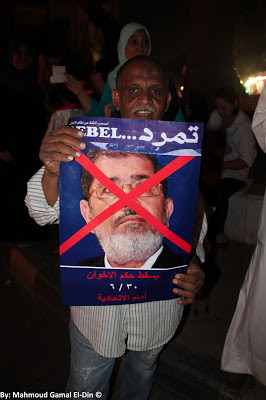Egyptian Presidential Election, 2014: One More Time
Two Years Have Passed
For the tenth time after January 25 Revolution Egyptians are asked to visit the ballot stations. Around this time two years ago Egypt saw its first real presidential election with 13 qualified candidates and five fairly big campaigns. This year the election seems to be quite different with only two candidates that are expected to qualify, a law that seems to be made to end the election as fast as possible without taking anything else into consideration, a government that supports one of the candidates, a very short campaigning period, and a result that is already known.
The one question is will we see a real election, or at least one that was as real as last time? The answer is probably not, yet in this series of posts I'm going to analyze these campaigns as small as they might be. But before I do this, here's some background information.
The Law
For the tenth time after January 25 Revolution Egyptians are asked to visit the ballot stations. Around this time two years ago Egypt saw its first real presidential election with 13 qualified candidates and five fairly big campaigns. This year the election seems to be quite different with only two candidates that are expected to qualify, a law that seems to be made to end the election as fast as possible without taking anything else into consideration, a government that supports one of the candidates, a very short campaigning period, and a result that is already known.
The one question is will we see a real election, or at least one that was as real as last time? The answer is probably not, yet in this series of posts I'm going to analyze these campaigns as small as they might be. But before I do this, here's some background information.
The Law
A new presidential elections law has been drafted and accepted in the past few days, yet this acceptance seemed to be only from the governmental side; the political parties and civil society organizations have great concerns regarding many points in the law that can result in elections that are not free, transparent, or fair. One of the main points that was raised to Interim President Adly Mansour before he issued the law was that it granted the Supreme Electoral Commission an immunity from legal scrutiny which will result in losing the right of appealing any decisions of the commission. President Mansour's justification to this was that appealing would drastically increase the elections' timeframe which they want to shorten as much as possible. According to some law scholars, this clause may cause the law to be unconstitutional under the 2014 Constitution which prohibits immunity.
Another article that is controversial is that of the monitoring of the elections; it has been said that the new law has taken away many of the observers' rights, turning the monitoring process into mere watching without having almost any chance to file complaints that would be taken seriously.
The law has also increased the maximum expenditure of the presidential campaigns to EGP 20 million, and has put a penalty of paying a fine of maximum EGP 500,000 for whoever exceeds this number. The penalty is seen as very weak and non-dissuasive since whoever paid a sum of over 20 million pounds wouldn't find paying another half a million a problem.
The Dates
The first round of voting, and probably the last, will be on May 26 and 27 of the is year. The door opened for presidential hopefuls to submit candidacies today, March 31. This is also the day when a candidate's supporter can issue an official supporting letter. Each candidate needs at least 25,000 supporting letters from 15 different governorates to be able to qualify. On the first day, 23,700 supporting letters were issued, and a good number of presidential hopefuls have visited the Supreme Electoral Commission office. The hopefuls will have until April 20 to submit their papers and supporting letters. This will be followed by the voting of the Egyptians abroad starting on May 15 and until May 18, giving the candidates less than a month of campaigning which many see as a very short time that proves that the commission is working in favor of the government's and army's candidate, Field Marshal, Abd El Fattah El Sisi.


Comments
Post a Comment